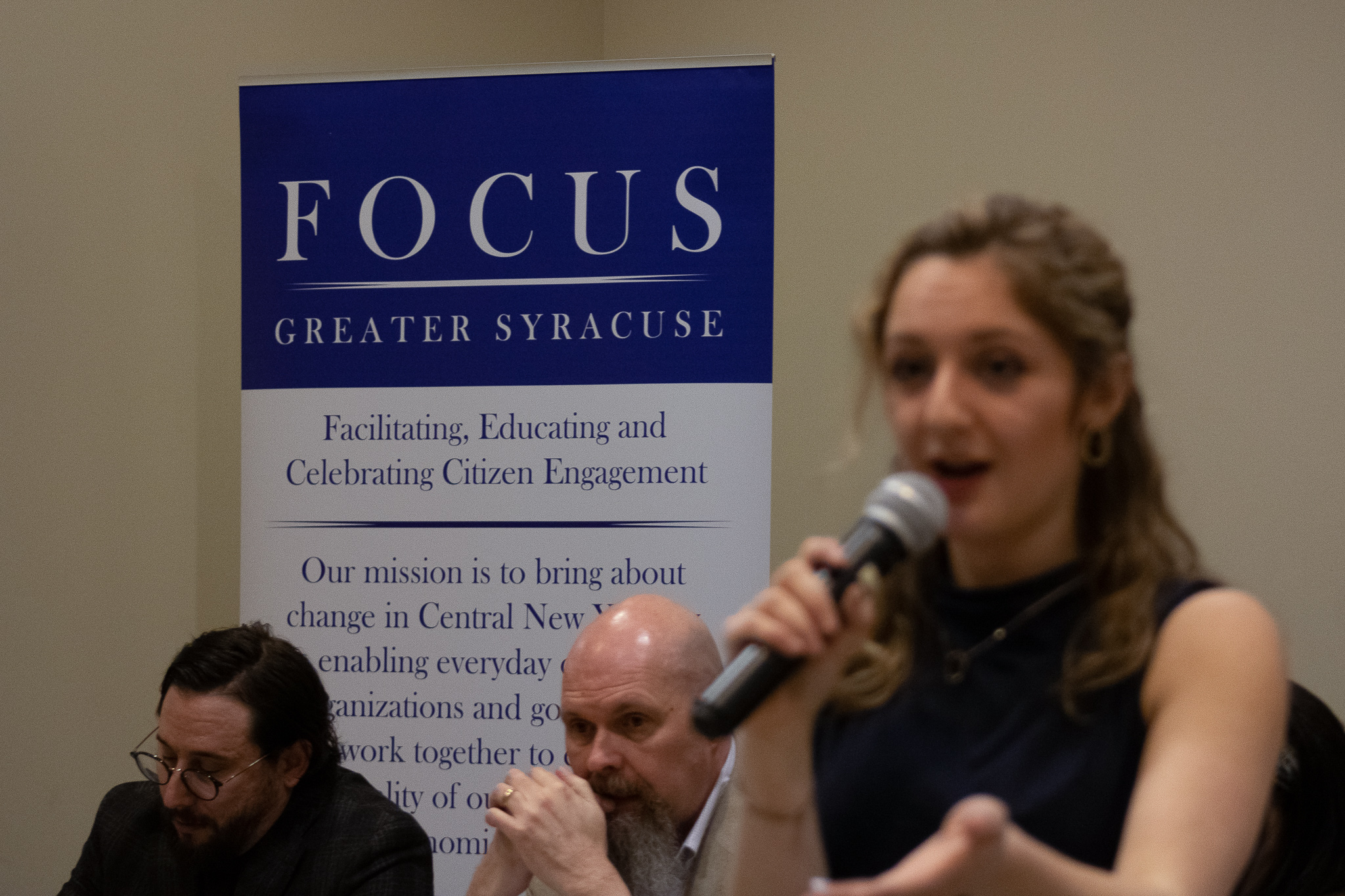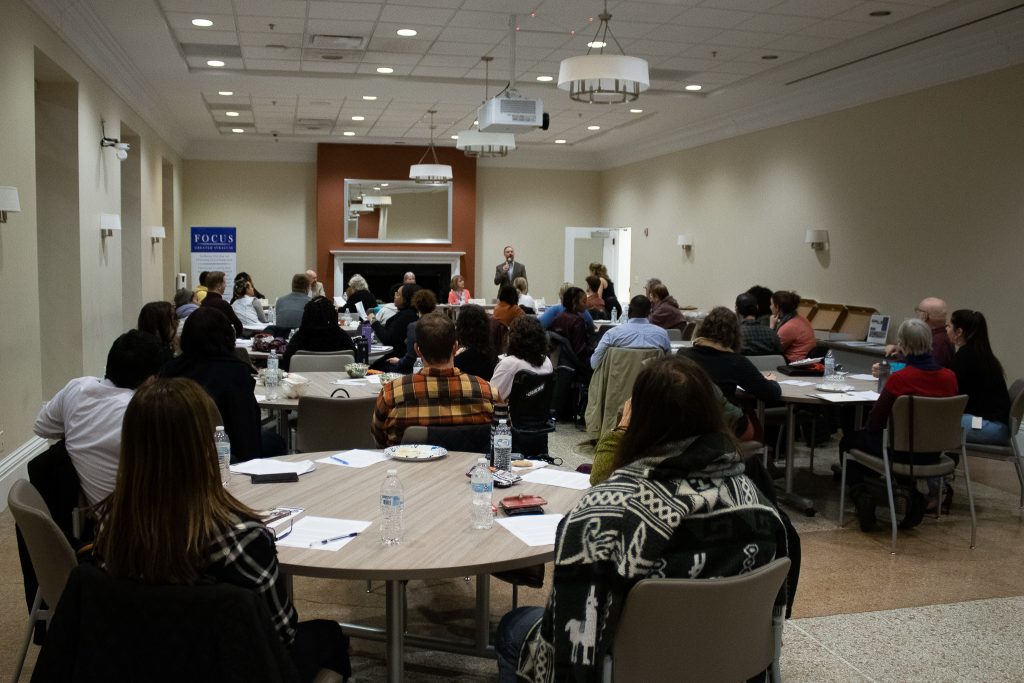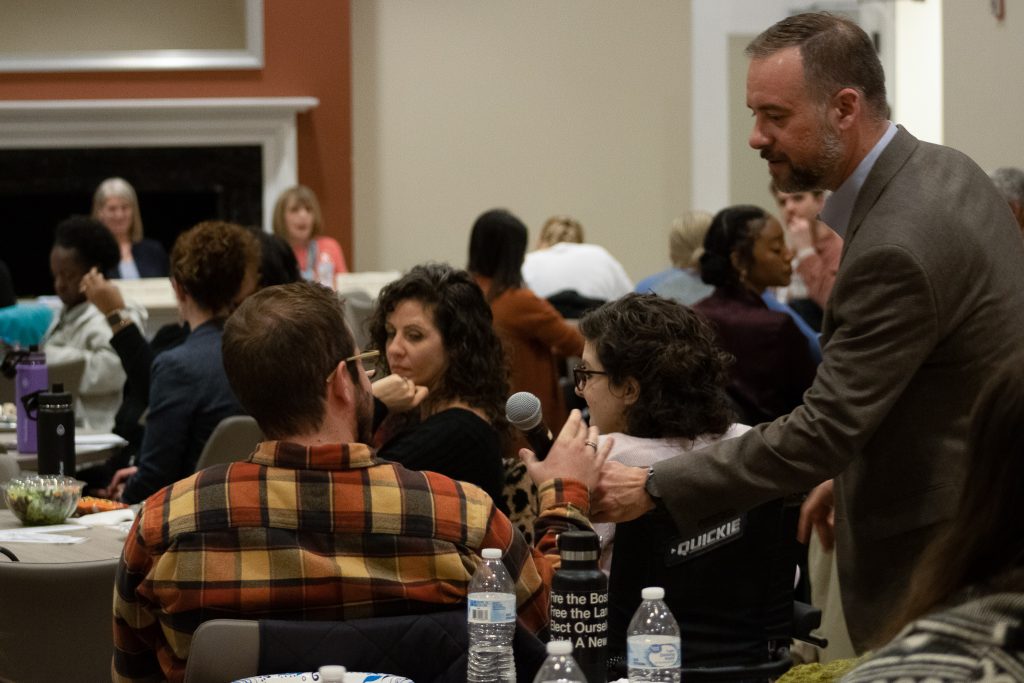
Taking strides to restore trust in society
Syracuse University researchers and local leaders are taking proactive approaches to combating disinformation.

ighting disinformation has become a daunting task for our society.
Constant developments in devices and platforms combined with the public’s growing distrust in institutions such as the media and government have created an environment ripe for fake news, falsehoods and propaganda to thrive.
A need to curtail the spread of disinformation has led some Syracuse University researchers and local leaders to pursue proactive approaches from media literacy to public forums to simply being more transparent.
There’s a hope among them that these tactics can restore trust between people, governments and media outlets. And if renewed trust creates a more knowledgeable society, the dangers of disinformation are less likely to prevail.
Know your media
The topic of disinformation became a personal one for Kelvin King when he fell victim to fake news.
King was driving to the University of Texas-Rio Grande Valley to begin doctoral degree coursework in August 2017 when Hurricane Harvey made landfall on the Texas coast.
During his road trip stops, King would scan his phone for updates, photos and video of the Category 4 hurricane’s devastating impact. Among the extraordinary images was a particular one of a large shark swimming in the flooded Houston streets.
“I did share it with my brother in law who believed me,” King said. “Because I was this techy person, he believed it right away. But at the end of the day, it was false.”
The photo of the street-swimming shark turned out to simply be a Photoshopped image that had been circulated several years before in the aftermath of other hurricanes.
But the story went viral and fooled thousands, including Fox News host Jesse Watters, who described what he saw during an episode of The Five and on Twitter generating more than 120,000 likes.
The takeaway from this story, according to King?
“Anybody can be deceived,” he said.
This episode inspired King, who is now an assistant professor at SU’s School of Information Studies, to study disinformation further and, in turn, become a strong advocate for media literacy. He believes that teaching people how to become critical of the information they view online can help prevent them from accidentally sharing fake news.
“If we can educate people on how to verify information themselves, it’s more likely to be effective as opposed to full counter debunking misinformation all the time,” King said.
Part of this education involves being more strict as to what one puts on social media, specifically as to whether it’s accurate or not.
Fellow iSchool professor Jennifer Stromer-Galley said false stories that stick out in distinctive manners can often attract more shares.
“Most research suggests that people are more likely to share news stories and information that is sensational, that’s novel, that’s controversial, that’s negative,” Stromer-Galley said. “Unfortunately, misinformation tends to spread through those kinds of novel negative, surprising.”
Stromer-Galley is a strong advocate for changes at the institutional levels within schools and government as a way of building trust. While she’s not against people individually working to become more media literate, she believes “that there are some larger institutional structural changes that have to happen.”
Stromer-Galley said that civic education on how our government operates, as well as how the news media functions as an institution, is dismal with kids growing up uninformed and unable to decipher the good information from the bad. According to her, fake news thrives in “low information environments, low-quality information environments,” and an improvement in education surrounding civics and media literacy can be a good method to combat the spread of disinformation.
“If people are spending time every day consuming quality news, then they’re less likely to fall for misinformation, because they have correct facts,” Stromer-Galley said.
Talk it out
While it may seem like a fairly simple suggestion, a conversation can work wonders when it comes to building trust between two parties.
FOCUS Greater Syracuse is a non-profit organization dedicated to promoting and improving civic education and citizen engagement in central New York. Its overall goal is to help break down the seemingly complex issues within local government and promote healthy civic engagement through connecting citizens with people within government and media.
Pew Research Center studies show public trust in government has been on a steady decline for roughly two decades. While other factors can affect one’s trust in government, such as political affiliation or race, the percentage of people who say they trust the government to do what is right has become stagnant around 20% — a drop from a post 9/11 average of 49% in October 2001.
FOCUS marketing and communications director Jessica Lisi said that face-to-face interactions between citizens and people in government can be vital to building trust between the two parties and fortifying civic knowledge for the whole community.
Part of the organization’s work includes FOCUS forums, which are monthly discussions that bring together a panel of experts to discuss a topic or issue relevant to the Syracuse community.
FOCUS also runs the Citizens Academy, which is a program that seeks to educate citizens on the various facets of local government. Topics include education, infrastructure, economic vitality, and more, and it also includes people from the local government coming in to answer questions and foster a dialogue with their constituents, something which Lisi believes is an essential part of building trust.
“I think a lot of the time also with local government, you're like, where do you start?” Lisi said. “How do you tackle this issue? Who would you go to? What's the first department you can talk to do? Who even has the power to do this?
“Citizens Academy helps to demystify that process, and that is how we have built trust.”
Lisi said FOCUS’s panels and programs don’t solely feature elected officials, but in her words, the “unsung heroes” who have worked in government for a long time and can give more context on certain topics.
For Reginald Braggs, FOCUS became an access point for him to learn about all things Syracuse.
Braggs became director of the Syracuse campus of SUNY Oswego in March 2020 as the pandemic first came to the United States and shut everything down. When things began to open back up, he enrolled in the Citizens Academy as a student in the fall of 2021, and remembered being surprised by the panelists and their willingness to interact with the students.
“They were very engaging,” Braggs said. “‘Here's my business card, here's my phone number, here's my email address. You have any other questions, let me know.’ That type of interaction, I was very surprised that they would make themselves accessible to us as students.”

Braggs’ overall positive experience with FOCUS led him to join their board of directors in January 2022. Since then, he’s worked to strengthen the Citizens Academy curriculum as well as increase the diversity of the panelists.
As for how to best build trust, Lisi touched again upon the importance of human connection and being accessible. She mentioned how she’s seeing more media organizations have a community outreach specialist position, which she believes is “essential” when it comes to media outlets connecting with communities.
“You need somebody on the ground, you need to be in those communities, you need to be interacting with those people and you need to be showing you’re accessible,” Lisi said. “You have to be there and you have to make those connections, because, if you don't, it becomes a lot harder, and there's a lot more distrust.”
King recalled how he initially had no plans to vote in the 2022 midterm elections until a representative from one of his local candidates connected with him while canvassing the neighborhood. The interaction motivated him to get involved and participate in his local election, and it also showed him how building trust can be a “two-way street.”
“When I got the flier, I looked at it, and I saw what he believed and aligned with what I had believed in,” King said. “Even though he's come in and made me want to go out, it also had to do with my education, what I knew.
“So if people were going to go door to door, or get to the grassroots and inform people, let people know how to verify information, your rights, I think that will make it better.”

BEING UP FRONT
Transparency and honesty were two tenets of building a trusting relationship between communities, the media, and the government.
During the earlier days of the COVID-19 pandemic, distrust in the government and the media surrounding the virus and the vaccines grew day by day.
King said conflicting statements from the government and the media further fueled this distrust. He recalls the rumors of COVID-19 originating from a Chinese lab and the government blunders that failed to adequately curb the disinformation.
“When there was a rumor that it started in a lab, within a few seconds, the government had started debunking it and then saying it wasn't in the lab,” King said. “After a few weeks … there was news that said, ‘Hey, we're going to investigate where COVID came from.’ Well, if [they] didn't know, [they] shouldn't have said it didn't come from the lab immediately, because people are then going to be like, ‘Oh, then you lied, right?’
Episodes like these may be contributing to Americans’ growing distrust in mass media. A 2022 Gallup poll survey showed a gradual increase in the number of Americans saying that they have no trust at all in the mass media, with the number rising from 24% in 2018 to 38% in 2022.
Stromer-Galley said the ideological divide in U.S. politics has contributed to a media distrust.
“Politicians have normalized the attack on traditional and mainstream news media,” she said. “There is a segment of our country who has been basically [ideologized] into thinking that the mainstream news media is biased – that it's against them and their ideologies for various reasons.”
King added that some media outlets inadvertently amplify disinformation in their efforts to debunk it, pointing to the COVID-19 origin rumors as one example.
Simply being honest about what is known and unknown could go a long way at rehabilitating the relationship between the media and the people, he said.
“It's okay to say, ‘I don't know,’” King said. “If I'm teaching, and I don't know something, it’s good for me to say, I don't know, I'm going to find out, as opposed to coming up with a statement and making it a statement of fact.”
Bragg argues that this transparency is an area in which FOCUS succeeds. He recalls feeling skeptical about the panelists when he was originally a student, but soon got “a sense that they were genuine.”
“You're hearing some of the things that are not as positive, and how they're trying to work on solving issues and how they don't have the answer for everything, and they really want to try to figure this out,” Bragg said. “I think it helps to create a dialogue.”
